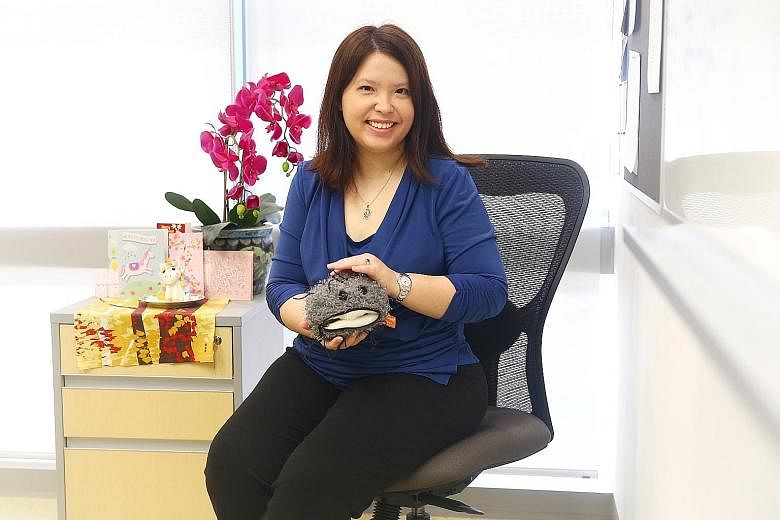In her role as a cancer researcher, she often studies cells smaller than this full stop.
A principal investigator at the Cancer Science Institute of Singapore, Dr Melissa Fullwood, together with her team of 15, is trying to understand the link between DNA and cancer by observing the three-dimensional organisation of DNA.
"DNA is actually about 3m long. But it has to fit into the tiny space of your cell, which is smaller than a full stop," explained Dr Fullwood, 34. "So it has to really fold and compact a lot in order to fit inside."
Her team believes that each fold, which they call a "switch", has biological meaning, and that cancer is caused when a switch is supposed to be up but is down instead, or vice versa. It has been a topic of interest for her for more than a decade, since her time as a PhD student working at the Genome Institute of Singapore.
"Our hope is that if eventually we do indeed find out what's going wrong, then we can help to develop some therapy for patients and try to correct it."
Dr Fullwood has been an assistant professor at the Nanyang Technological University School of Biological Sciences for three years, where she teaches an undergraduate course on cancer biology and mentors PhD students in their research projects.
She has always enjoyed science as a subject, right from her primary school days at Marymount Convent School. "I always enjoyed being out with nature, exploring the school field and spending time in the eco garden. During recess, I would prefer to wander off into the school field and eat my food out there instead of the canteen."
-
1 in 3
-
Proportion of people that Dr Melissa Fullwood says will get cancer in their lifetime.
-
1 in 5
-
Proportion of people that she says will die from cancer.
When she went to Raffles Junior College from Raffles Girls' School, her teachers saw her interest in science and strongly encouraged her in that area.
She was one of four students who represented Singapore at the International Biology Olympiad in Belgium in 2001, and brought home a silver medal.
"We had to take theory and practical tests that were designed to see how much we knew about biology, and also test our critical thinking skills."
She later took up a scholarship with the Agency for Science, Technology and Research for her undergraduate studies at Stanford University, and PhD studies at the National University of Singapore Graduate School for Integrative Sciences and Engineering.
"It has always fascinated me in general. Why do we get sick? What can people do about it? Then as you grow older, you hear about people getting diseases like cancer and dying from them. I thought, is there any way that I can help them?"
Dr Fullwood pointed out that there are more men than women in the sciences.
"There're actually very few women in science. If you look at the numbers, you have about an equal number of guys and girls (studying) science as undergraduates," she said. "But as time goes on and you look further and further up the ladder, you'll see that the number of women drastically drops."
The last survey to reveal the breakdown by gender of PhD-holding research scientists and engineers was conducted in 2014.
This National Survey of Research and Development showed that there were 7,168 male PhD-holding research scientists and engineers compared with 2,483 women, a ratio of nearly three to one.
According to Dr Fullwood, this is due to the "motherhood penalty", as women may be worried that they may be faulted for taking time out of the lab to have and raise their children.
Dr Fullwood, who has been married for three years, said: "I don't have kids at the moment, so I cannot say anything about whether it's really difficult or easy to make time (for children)."
She said she has personally been on the receiving end of insensitive questions in her line of work. "For example, sometimes in a work setting, they will start to ask me about whether I'm going to have kids. I find that a bit unprofessional."
She also said that there may be some inherent discrimination that turns women off from the science field. A 2012 study by Yale University researchers bears this out, revealing a gender bias in the science field in the United States.
In the study, a total of 127 scientists were shown the job applications of male and female students who were both equally qualified. Both male and female scientists consistently rated the male candidate higher in factors like competency, and also preferred hiring him.
Dr Fullwood said that she had a friend from her undergraduate days who died from brain cancer shortly after she graduated.
It is such events that drive her to work on in this field despite any challenges faced.
"One in three people will get cancer in their lifetime, and about one in five will die from cancer. It's definitely a major problem in the world today, and I feel quite happy that I can work on this disease and hopefully try to find a solution."
She also sees value in her teaching work, as she feels that even if her students do not go on to pursue science, they would at least have some knowledge of cancer and how to prevent the disease.
Dr Fullwood said students in Singapore tend to pursue areas of study that can get them higher-paying jobs in the future, instead of the science, technology, engineering and mathematics (Stem) sectors.
In 2015, Prime Minister Lee Hsien Loong said at the opening of the Singapore University of Technology and Design that it was a challenge getting students and graduates to enter the Stem sectors.
He also said that students growing up in a more developed economy take science and technology more for granted.
"Singapore is a nation that made its money in terms of finance, and that's still true today. It's still an extraordinarily powerful draw... the financial sector, the medicine sector, law, and all the fields that people know bring quite high salaries," said Dr Fullwood.
She added that she has spoken to some parents and realised that they too are thinking about the money.
Dr Fullwood said that girls who are interested in the field of science should not give up on their ambitions. "I would advise them to work on improving themselves, and also to believe in themselves."


